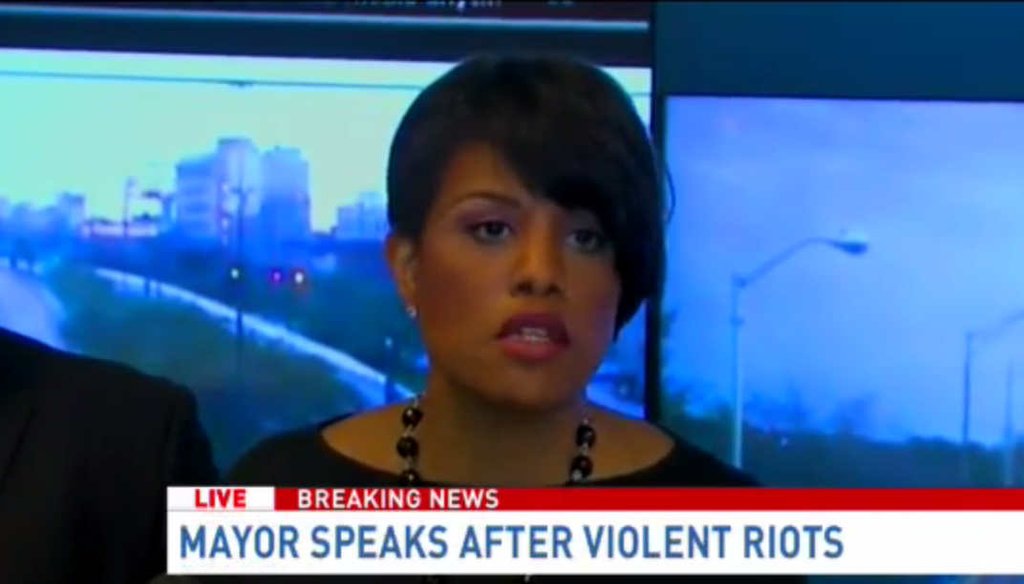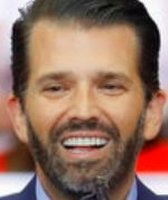Get PolitiFact in your inbox.

Baltimore Mayor Stephanie Rawlings-Blake reacts to charges that she allowed rioters to loot and burn.
Did Baltimore Mayor Stephanie Rawlings-Blake make a conscious decision to allow violent protestors to loot and set fire to stores and police cars in her city? That’s the take from conservative pundits and journalists.
The unrest began Saturday, April 25, in Baltimore as a peaceful march spun off groups who battled with police. As the evening wore on, about 1,300 police officers from the city and nearby jurisdictions fought to maintain control. That night, Rawlings-Blake held a news conference.
A local CBS news video caught her saying we "gave those who wished to destroy space." The online conservative news outlet Daily Caller picked up on that, as did conservative radio host Rush Limbaugh (hat-tip to Bloomberg’s Dave Weigel).
"Baltimore, like our ambassador in Libya, was left unprotected and undefended," Limbaugh said April 26. "Those who wished to destroy were given space to do it because on balance -- and that's what this is all about, she said -- on balance that's the safest way to go."
We thought it would help to provide the entire text of what the mayor said, and the clarification her office put out about 24 hours later.
Here’s how Rawlings-Blake responded to a question of how the police conducted themselves Saturday night. (The question was inaudible, but the mayor said later it focused on property damage.)
"We’ve had these kinds of conversations before, and I made it very clear that I work with the police and instructed them to do everything that they could to make sure that the protesters were able to exercise their right to free speech. It’s a very delicate balancing act. Because while we try to make sure that they were protected from the cars and the other things that were going on, we also gave those who wished to destroy space to do that as well. And we worked very hard to keep that balance and to put ourselves in the best position to de-escalate and that’s what you saw this evening."
And this is the full text of the statement from the mayor’s office the next day, Sunday. It came out under the name of Howard Libit, director of Strategic Planning and Policy:
"What she is saying within this statement was that there was an effort to give the peaceful demonstrators room to conduct their peaceful protests on Saturday. Unfortunately, as a result of providing the peaceful demonstrators with the space to share their message, that also meant that those seeking to incite violence also had the space to operate. The police sought to balance the rights of the peaceful demonstrators against the need to step in against those who were seeking to create violence.
"The mayor is not saying that she asked police to give space to people who sought to create violence. Any suggestion otherwise would be a misinterpretation of her statement."
Her office also offered an official clarification of her comments with emphasis added:
"I’ve made it very clear that I work with the police and instructed them to do everything that they could to make sure that the protesters were able to exercise their right to free speech. It’s a very delicate balancing act, because, while we tried to make sure that they were protected from the cars and the other things that were going on, we also [as a result] gave those who wished to destroy space to do that as well. And we worked very hard to keep that balance and to put ourselves in the best position to de escalate, and that’s what you saw."
On Monday, April 27, the mayor held another news conference where she was asked if her words might have encouraged the renewed rioting on Monday. Here is that transcript:
"The very blatant mischaracterization of my words was not helpful today. I was asked a question about the property damage that was done. And in answering that question I made it very clear that we balance a very fine line between giving peaceful protestors space to protest. What I said is, in doing so, people can hijack that and use that space for bad. I did not say we were accepting of it. I did not say we were passive to it. I was just explaining how property damage can happen during a peaceful protest. It is very unfortunate that members of your industry decided to mischaracterize my words and try to use it as a way to say that we are inciting violence."
Question: "There was no word to the police to hold back. To let some of this happen?"
"Absolutely not. Absolutely not. And I’ve never said anything to that effect. What we did was manage a peaceful protest in the best way possible and when it got violent and destructive, we responded to that. We have an obligation to protect people's’ First Amendment rights. We also understand that through the best training and best practices that we have to do everything that we can to de-escalate and those were the tactics that were deployed.
"Did people exploit those tactics, that space that we facilitated for people to have peaceful protest for bad? Yes they did. But we didn't endorse it. We didn’t allow it."
There were about 35 arrests Saturday night, followed by a lull. Then on Monday, the violence erupted more powerfully than ever. Rioters ransacked a mall as well as many other local merchants. There was looting and arson. Police arrested hundreds of people. The mayor imposed a curfew and asked the governor to send in units of the National Guard.
The mayor’s words on Saturday were at best garbled, but by late the next day, the public had a clearer understanding of her meaning.
Our Sources
CBS Baltimore, Baltimore Mayor: ‘Gave Those Who Wished to Destroy Space to Do That’, April 25, 2015
Baltimore Sun, After peaceful start, violence mars Freddie Gray protest in Baltimore, April 26, 2015
Baltimore Sun, After the protests, calm sought for Freddie Gray's burial, April 26, 2015
Baltimore Sun,Riots erupt across West Baltimore, downtown, April 27, 2015
CBS News, Protest over police custody death becomes violent, April 25, 2015
CBS News, Chaos spreads in Baltimore as police try to restore order, April 27, 2015
ABC News-WJLA, Baltimore Mayor Rawlings-Blake press conference on riots, April 27, 2015
Daily Caller, Baltimore Mayor: Space Was Provided To Those Who ‘Wished To Destroy’ , April 26, 2015
Bloomberg, ‘Space to Destroy’: The Short History of a Dangerous Botched Quote, April 27, 2015
Baltimore Sun, Mayor, commissioner denounce work of agitators, April 25, 2015
City of Baltimore, Statement on rights of protestors, April 27, 2015 (late Sunday)
Rush Limbaugh Show, Baltimore Mayor Gave Rioters "Space to Destroy", April 27, 2015




















































